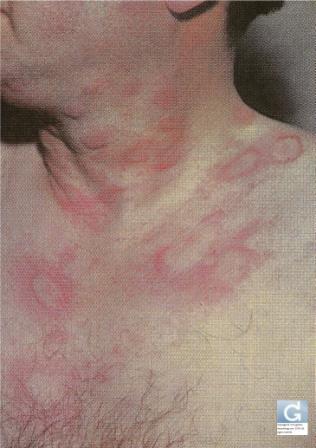Urticaria (hives)
Dr Christophe Hsu – dermatologist. Geneva, Switzerland

What is Urticaria (Hives) ?
- Urticaria or hives as it is commonly called, is an itchy rash consisting of localized swellings of the skin that usually last for a few hours before fading away.
- When urticaria develops around loose tissues of the eyes or lips, the affected area may swell excessively.
- Although frightening in appearance, the swelling (called angio-oedema) goes away in 12 to 24 hours with treatment.
How is urticaria produced ?
- Urticaria results from some changes in the small blood vessels of the skin.
- Such changes are brought about by the release of some substances in the body, the commonest of which is histamine.
- Histamine is released from cells called mast cells by either an allergic or non-allergic reaction.
What causes single attacks of urticaria ?
- Acute urticaria, which can last from a few hours to as long as a week is usually caused by drugs, specific foods or a viral infection. Sometimes, no cause can be detected.
- What are the foods that can cause acute and repeated attacks of urticaria ?
- Foods that can cause urticaria include :
- Nuts
- Eggs
- Fresh fruits (especially citrus)
- Chocolates
- Fish and shellfish
- Tomatoes
- Milk and cheese
- Spices
- Yeasts
- Foods additives and preservatives such as tartrazine (yellow dye) may also be responsible. Hives may appear within minutes or several hours after ingestion of the food depending on its rate of absorption.
What are the drugs that can cause urticaria ?
- Drugs that commonly cause urticaria include :
- Pain killers/Anti-rheumatics e.g aspirin, codeine
- Antibiotics e.g penicillins, sulphonamides
- However, any drug should be suspected even if it has been taken for a long time without ill effects previously. Drugs commonly cause acute urticaria but they may also aggravate chronic urticaria.
What else can cause urticaria ?
- Recurring attacks of urticaria may be caused by physical agents such as:
- sunlight
- cold
- pressure
- sweat.
- Urticaria caused by such agents is called physical urticaria. The causative agent is usually recognized by the patient.
Chronic Urticaria
- This is urticaria occurring almost daily and lasting more than two months.
- In the majority of patients, no cause or significant aggravating factors can be found.
- Physical urticaria may be present as well in some patients.
- Food allergy is seldom a cause of chronic persistent urticaria even though some foods may aggravate it.
- Infections such as candidiasis (a kind of yeast infection) may be a cause, although, not common.
- Emotional stress is known to aggravate chronic urticaria in some.
- 50% of cases of chronic urticaria, clear spontaneously in about 6 months.
How is urticaria treated ?
- The best treatment for urticaria is to identify and avoid the cause and any aggravating factors.
- While investigating the cause, anti-histamines are prescribed for symptomatic relief.
- Antihistamines:
- when taken orally, take about 90 minutes to relieve an already formed hive.
- work best if taken on a regular basic to prevent the formation of hives.
- To avoid side-effects like drowsiness, non-sedative antihistamines are available.
- Antihistamine creams are ineffective.
- Elimination diets are not helpful unless a particular food is suspected.
- Skin tests are generally of no use.
- Blood and urine test are sometimes carried out to exclude infection as a cause of chronic urticaria.
Contributors
Dr Christophe Hsu – dermatologist. Geneva, Switzerland
Dr Husain Ali Mahdi Juma (دكتورحسين علي جمعه) – dermatologist. Manama, Bahrain
National Skin Centre. Singapore
العربية 中文-汉语 中文-漢語 Deutsch Español Italiano Português русский язык Tagalog 한국어 日本語


